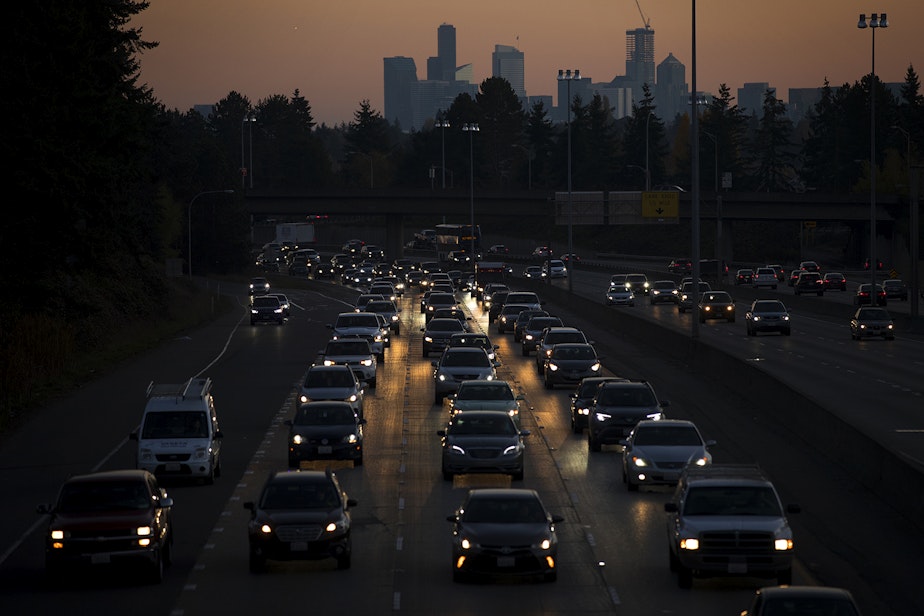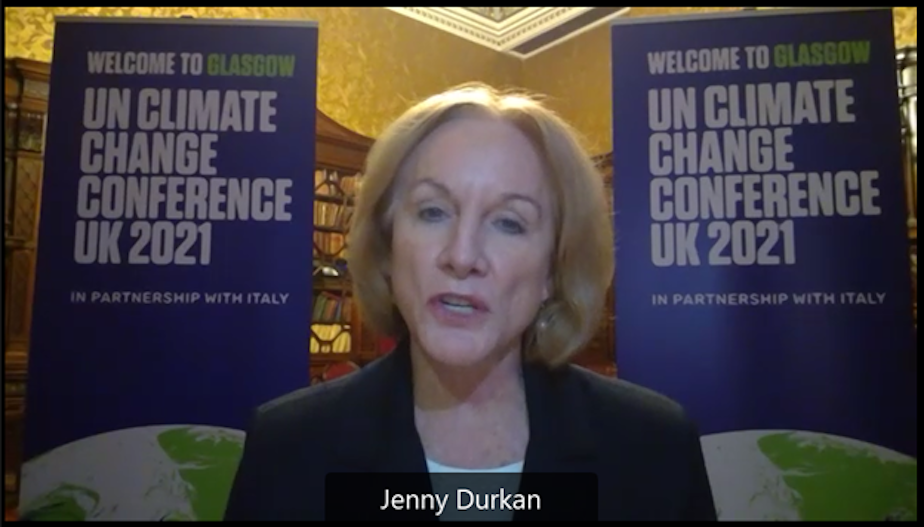Seattle mayor proposes new climate measures to tackle pollution from traffic and buildings

At the global climate talks in Glasgow, Scotland, Seattle Mayor Jenny Durkan announced policies she says will take a big bite out of Seattle’s climate-harming emissions from buildings and cars.
“We are really working toward urgent action on climate change,” Durkan said.
She proposes requiring large buildings to clean up their carbon acts, starting in five years.
Her executive order seeks to make existing commercial and multifamily buildings convert to clean electric power and eliminate the use of fossil fuels no later than 2050. Initial emission reductions would begin by 2026.
Seattle has mandated climate-friendliness in new construction but to date has done much less to tackle the bigger problem: the impacts of existing buildings.
The proposed policy would cut building-based emissions in the city 39% by 2030 and eliminate them by 2050, according to Durkan.

Monday’s executive order directs city staff to engage with community groups and draft legislation for performance standards for large buildings by next July, six months after Durkan’s term has ended. Then the Seattle City Council would have its say.
Of course, public process is often where proposals go to die in Seattle, like one Durkan touted in 2018 for downtown tolling, which she dropped in 2020.
Other proposals announced by Durkan Monday include:
- Creation of an urban pedestrian-only zone by summer 2022.
- A $1 million pilot to replace diesel trucks with electric ones in the heavily polluted Duwamish Valley. City officials say the $1 million pilot is expected to subsidize the purchase of 15-20 electric trucks.
- A ban on fossil fuel use in city-owned buildings by 2035.
- A new design of the Burke-Gilman Trail’s 1.4-mile “missing link,” which has been stalled by opposition from some Ballard businesses for decades.
- Free transit for Seattle middle schoolers. High schoolers got free transit in 2020. “We know that kids, when they ride transit, become transit users for the rest of their life,” Durkan said.
“This provides safe, reliable, and affordable trips for families,” Alex Hudson with the Transportation Choice Coalition said at the mayor’s press conference. “Transportation is the single largest contributor to greenhouse gas emissions as well as the air pollutants that affect public health and increased rates of asthma and other public health emergencies.”
Sponsored
“The city of Seattle is leading America in all of our efforts,” Durkan said, echoing a claim Seattle mayors have made for nearly 20 years.
Following similar bans in Oakland, San Francisco, San Jose, and other California cities in 2019 and 2020, Seattle banned most natural gas use in new construction of large buildings in February 2021.
State law prohibits Washington cities from banning fossil fuel use or imposing tighter energy codes on residential buildings less than four stories tall.
“Three cities (Washington D.C., New York, and St. Louis) and Washington state have already passed legislation creating building performance standards,” trade publication FacilitiesNet.com reports.
Seattle’s Green New Deal law requires the city to aim for zero climate pollution by 2030, not 2050, as Durkan’s policies do.
Sponsored
“I thank [the Seattle City] Council for what they passed in terms of some of the targets they want to meet, but targets mean nothing unless we have a cohesive plan,” Durkan said.
“Zero emissions by 2030 is the proper goal, and what the City committed to in 2019,” climate activist Jess Wallach with 350 Seattle said in an email.
“Actually leading the nation would look like doing more than taking four years to make an underwhelming promise with no real targets or accountability,” Wallach said.
Durkan’s proposed 2022 city budget devotes much less money to curbing fossil fuels than activists have called for. It includes $1.7 million to convert 125 low-income households from oil heat to electric heat pumps. The “solidarity budget” pushed by progressive activist groups calls for $85 million annually over three years, enough to convert all oil-heated low-income homes in the city to clean energy.
Both candidates for Seattle mayor, Lorena González and Bruce Harrell, one of whom will replace Durkan in January, have signed a climate pledge to reduce the city’s greenhouse gas emissions 58% by 2030 and eliminate them by 2050.




